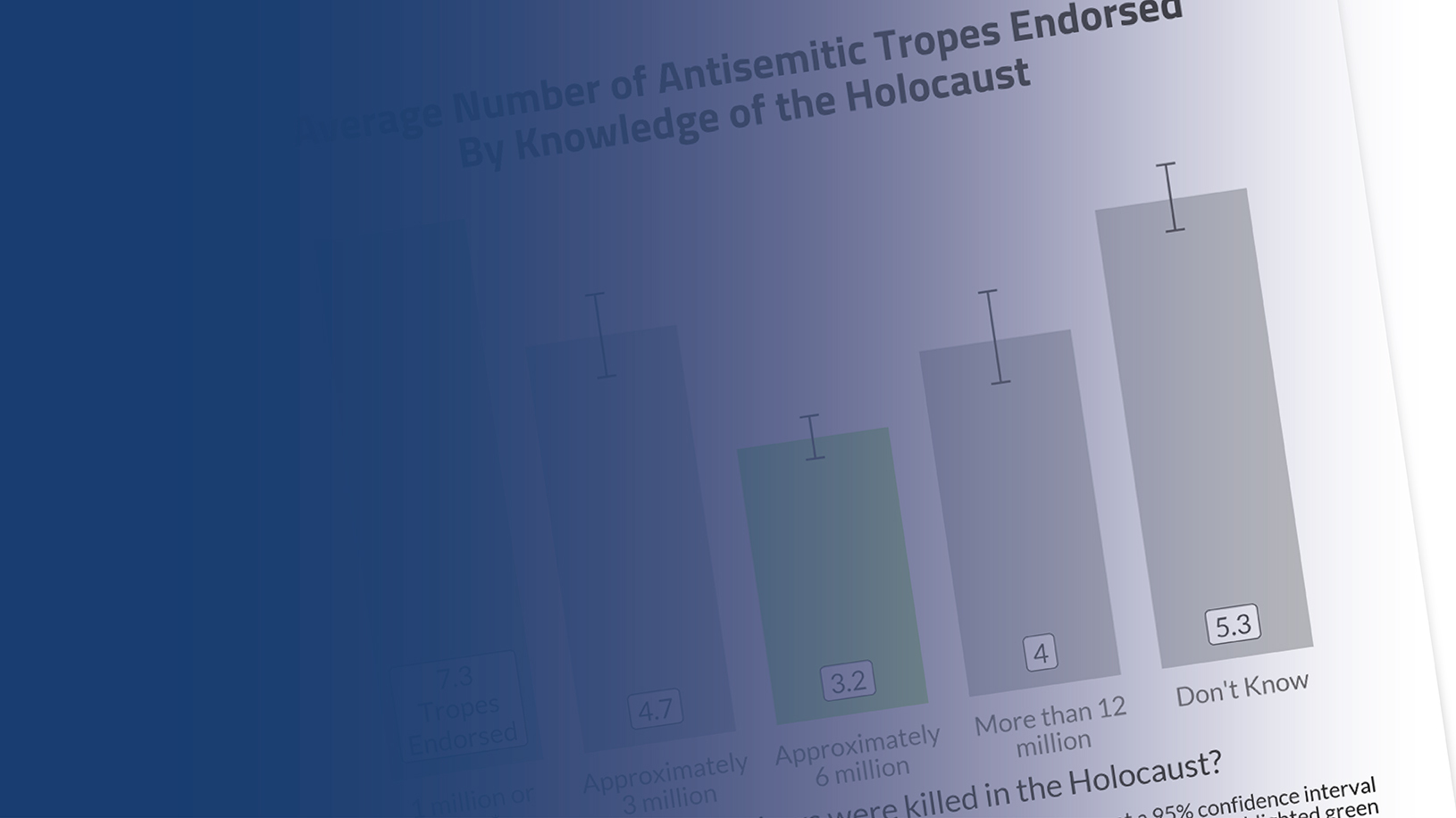
Related Content


Fight Antisemitism
With increased hate-fueled violence, incidents of antisemitism, and challenges to democratic values and institutions, Holocaust education remains an integral aspect of countering prejudice and cultivating inclusion.
However, Holocaust education is currently mandated in only 25 states, and there remains a need to understand how learning about this event affects individuals' belief systems and the willingness to act upon those beliefs.
Antisemitism threatens the safety of Jewish people and communities around the world and is an animating force of dangerous extremist ideologies. Like all forms of prejudice and discrimination, antisemitism has a profound impact on the whole of society, undermining peace, and human rights. Antisemitism is no longer confined to extremist circles and has become increasingly mainstreamed, a major driver of which is social media and the online sphere.
In an era of rising antisemitism, coupled with the fading memory of the Holocaust, the relationship between Holocaust education and combatting antisemitism has become even more critical to understand.
Holocaust Knowledge is Lacking Among Younger Americans
The latest research from ADL’s Center for Antisemitism Research (CAR), suggests a direct relationship between deficiencies in Holocaust education and heightened prejudicial, antisemitic beliefs. Our findings reveal that believing in antisemitic tropes is strongly correlated with a lack of knowledge about Jews, Judaism, and the Holocaust.
First, CAR found that basic knowledge about the Holocaust is severely lacking in the general U.S. population, and particularly among younger Americans.
- Most Americans cannot accurately identify the number of Jews killed in the Holocaust; nearly 1 in 4 Americans say they “don’t know” and more than 1 in 5 significantly under-estimate the number of Jews killed.
- Nearly 6 out of 10 Americans under 30 cannot accurately identify how many Jews were killed in the Holocaust.

In an era where preserving the memory of the Holocaust is becoming paramount, as more and more survivors who experienced the Holocaust first-hand are passing away, research suggests that Holocaust learning also plays an important role in combatting antisemitism:
- Respondents who correctly answered that 6 million Jews were killed in the Holocaust believed the fewest anti-Jewish tropes: only 3.2, on average, compared to 7.3 for those who underestimated the number of Jews killed at 1 million or fewer.
- Those who indicated they did not know the number of Jews killed in the Holocaust believed, on average, 5.3 anti-Jewish tropes.
- This strongly indicates that Holocaust education can be an effective intervention against antisemitic beliefs.
These findings strongly support the need for more and higher quality education on the Holocaust. In addition to building knowledge about the events surrounding the Holocaust, secondary school education on the Holocaust is correlated with reduced antisemitism, increases openness to differing viewpoints and builds civic efficacy.
Education on the Holocaust instills more in students than facts and figures. Holocaust education aims to teach moral lessons on empathy and educate on the fragility of democracy, the role of antisemitism as Nazi ideology, and the importance of bearing witness to the past.
Individuals who have had education on the topic of the Holocaust also show higher rates of critical thinking and a greater willingness to challenge intolerant behavior. Collectively, this helps to build a better society.
Researchers also probed whether how one learned about the Holocaust was predictive of one’s belief in anti-Jewish tropes. Antisemitism thrives on a complex ecosystem of myths and tropes which perpetuate false stereotypes and inflame viewpoints against Jewish people.

Respondents who indicated their school taught specifically about the Holocaust endorsed the fewest anti-Jewish statements (3.8, on average).
This is consistent with past findings that showed those who get their information about the world from mainstream news outlets had lower rates of belief in anti-Jewish ideas than those who received their information from the internet or other sources.
This suggests that learning about the Holocaust in a controlled, educational setting, using high quality Holocaust curricula delivered by professional educators may help mitigate antisemitic sentiments and beliefs.
It is crucial for educators to not only teach the facts and history of the Holocaust, but also address the underlying sources of hate and antisemitism that still exist today. By acknowledging and discussing these issues in the classroom, students can gain a deeper understanding of the impact of hate and the importance of combating it.
Furthermore, it is essential for educators to address the prevalence of mis/disinformation online and teach students how to critically evaluate sources. This is particularly important considering the rise of false information being spread about the Holocaust and other historical events.
A recent study found that schools that only briefly mentioned the Holocaust had students who endorsed an average of 4.8 tropes, indicating a lack of understanding and potentially harmful beliefs. By acknowledging and discussing these issues in the classroom, students can gain a deeper understanding of the impact of hatred, antisemitism, and intolerance.

Our research indicates that a relationship between Holocaust knowledge and antisemitism may be explained in part by conspiratorial thinking more generally. Holocaust education seeks to dismiss conspiratorial thinking by using sound pedagogy on teaching about this event, and also linking this event to contemporary instances of antisemitism in the modern era. Thus, building a fluid historical arc for students to grapple with the long history of antisemitism as conspiratorial thinking, and the importance of media literacy in ascertaining mis/disinformation, motivation, and implementation when consuming content online.
- A body of research has shown that those who believe one conspiracy theory are more likely to endorse other conspiracy theories. CAR research supports this conclusion: those who embraced conspiratorial ideas like the Great Replacement Theory, were inclined to endorse more antisemitic ideas, which often take the form of a conspiracy theory about alleged Jewish power and subterfuge.
- Holocaust denialism and distortion often include elements of conspiracism, frequently based in the fantasy that Jews invented or exaggerated the Holocaust as part of some nefarious agenda.













